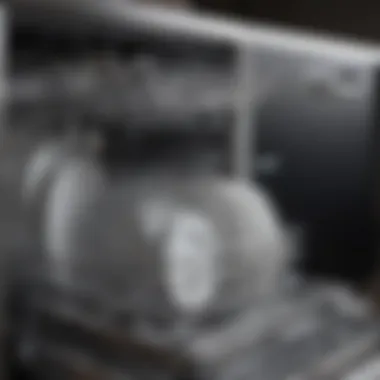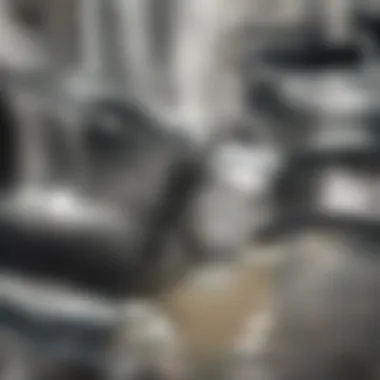Effective Strategies for Dishwasher Cleaning


Intro
Maintaining a clean dishwasher is paramount for both hygiene and efficiency. Over time, food particles, grease, and mineral deposits accumulate, affecting the machine's performance. This article will explore various effective methods to clean your dishwasher, both natural and commercial. We will evaluate their efficacy, safety, and environmental impact. Additionally, we will address common challenges users face and preferences regarding cleaning options.
Understanding how to keep your dishwasher clean ensures it operates effectively, prolongs its lifespan, and maintains a sanitary environment for your dishes. Let's dive into the details of cleaning agents and techniques available to achieve the best results.
Preamble to Dishwasher Maintenance
Dishwashers serve as essential appliances in modern kitchens, making cleaning dishes convenient and efficient. However, maintaining a dishwasher is often overlooked, leading to performance decline over time. This section emphasizes the significance of regular maintenance, underlining the benefits and considerations necessary for optimal operation. A clean dishwasher not only ensures better hygiene for the dishes but also enhances the lifespan of the appliance.
Importance of Regular Cleaning
Regular cleaning of your dishwasher is crucial for several reasons. First, it helps prevent the buildup of food particles and grease, which can foster bacterial growth. With consistent maintenance, the interior surfaces remain clean, promoting efficient washing cycles. Regular cleaning minimizes the risk of unpleasant odors that may emanate from stagnant water and debris. Moreover, the efficiency of the dishwasher is enhanced, leading to reduced energy consumption, which in turn saves on utility bills. A well-maintained dishwasher can also prolong the lifespan of critical components, avoiding costly replacements.
Consequences of Neglect
Neglecting to clean your dishwasher can lead to various issues that affect both performance and hygiene. Over time, buildup of grime can clog filters and spray arms, leading to ineffective cleaning cycles. This can result in dishes coming out dirty, which contradicts the primary purpose of the appliance. Furthermore, failing to clean can produce foul odors and attract pests. In the worst scenarios, neglect might lead to significant breakdowns, requiring expensive repairs or replacements. Ultimately, neglecting dishwasher maintenance translates to increased frustration and decreased efficiency.
"A clean dishwasher is a practical investment in your kitchen's health and efficiency."
Understanding Your Dishwasher
Understanding your dishwasher is fundamental to extending the life of this essential appliance. Improving your knowledge about its parts and operation enables you to implement effective cleaning routines. A well-maintained dishwasher not only ensures cleanliness of dishes but also optimizes efficiency. This section aims to illuminate the significance of grasping the different types of dishwashers and their components.
Types of Dishwashers
Dishwashers come in various forms, each suited for specific needs. The major types include:
- Built-in Dishwashers: These are standard in most kitchens, installed under the countertop. They are convenient, with larger capacities but require permanent plumbing.
- Portable Dishwashers: Ideal for smaller kitchens, portable dishwashers can be moved and connected to the sink as needed. They provide flexibility but may have less capacity.
- Countertop Dishwashers: These smaller units sit on the counter, using less space. While they are great for limited areas, their capacities are minimal.
- Drawer Dishwashers: These dishwashers open like drawers, making loading and unloading easier. They are often more energy-efficient as you can run small loads.
Knowing the type of dishwasher you have determines the cleaning methods best suited for it. Not all types might have the same internal configuration, meaning specific components will differ in maintenance requirements.
Common Components That Need Cleaning
Certain parts of dishwashers demand regular attention to function effectively. Key components that should be on your cleaning checklist include:
- Filters: Critical for trapping food particles, filters need cleaning every few weeks. A clogged filter can lead to inadequate cleaning.
- Spray Arms: These distribute water during cycles. Debris can block holes, reducing their efficiency. Regular inspection and cleaning help avoid blockage.
- Door Seals: Over time, seals can gather grime. Clean seals ensure a tight fit and prevent leaks.
- Interior Walls: The walls can harbor grease and food residues. Wiping them down contributes to overall cleanliness.
- Detergent Dispenser: This area can build residues that interfere with detergent release during cycles.
Keeping these components clean results in better cleaning performance and longevity of your dishwasher.
Awareness of these elements not only helps in maintaining your appliance but also enhances your environmental responsibility by reducing inefficiencies. With this understanding, one can now proceed to choose the right cleaning agents and methods.
Best Cleaning Agents for Dishwashers
Choosing the right cleaning agents for your dishwasher is crucial. The proper solution not only cleans effectively but also maintains the appliance's longevity. Understanding the different types of cleaning agents can help you make informed choices, preventing buildup and ensuring your dishwasher operates optimally. Different agents have unique properties that can provide excellent results depending on the task at hand. In this section, we will analyze both natural and commercial cleaning solutions.
Natural Cleaning Solutions


Natural cleaning solutions are a great choice for those seeking non-toxic options. They are usually inexpensive and readily available in most households. Here are a few popular natural cleaning agents:
Vinegar
Vinegar is a highly effective cleaning agent due to its acetic acid content. This substance breaks down grease and eliminates odors. Many people choose vinegar because it's safe and doesn't contain harmful chemicals. One unique feature is its capacity to dissolve mineral deposits that may form in the dishwasher. However, overuse can be problematic, as vinegar can potentially corrode some components if not diluted properly. To use vinegar, simply place a cup on the top rack and run a hot cycle.
Baking Soda
Baking soda is well known for its deodorizing properties. It works by neutralizing odors and can also help to remove stains; making it a popular choice for cleaning dishwashers. Its key characteristic is its gentle abrasive nature, allowing it to clean without scratching surfaces. Another advantage is its safety for both dishwasher components and the environment. Users often sprinkle baking soda in the dishwasher and run a cycle after using vinegar for enhanced cleaning. However, it may not be as effective for tough grime compared to stronger chemical cleaners.
Citric Acid
Citric acid is another powerful natural cleaner. It is derived from citrus fruits and excels at removing limescale and mineral deposits. This agent is often considered beneficial because of its strong chelating properties, which bind to minerals and help flush them away. The unique characteristic of citric acid is its ability to enhance the cleaning power of other agents when used together. However, overuse can lead to damage of certain dishwasher parts. A typical method of use is by mixing citric acid with hot water and running a cycle through the dishwasher.
Commercial Cleaning Products
For those seeking convenience and efficiency, commercial cleaning products can save time and effort. They are specifically designed to tackle tough stains and residue effectively. Here are some common types:
Dishwasher Cleaner Tablets
Dishwasher cleaner tablets are popular for their ease of use. Their pre-measured doses make them a convenient choice for users who want effective cleaning without measurement hassle. The key characteristic of these tablets is their powerful formula that often combines multiple cleaning agents in one product. Users find that they can tackle grease and odors effectively. However, they may have synthetic chemicals that some individuals prefer to avoid, particularly if they are concerned about environmental impact.
Liquid Cleaners
Liquid cleaners are versatile and can be poured directly into the detergent compartment or used during the cleaning cycle. Their key advantage is easy application, as they dissolve quickly and can penetrate stubborn stains. They cater to various needs, making them ideal for all types of dishwashers. Liquid cleaners may include fragrances, which some users enjoy, though they can also leave a residue if not rinsed properly.
Powder Cleaners
Powder cleaners offer strong cleaning action and can often handle very tough buildup. Their main characteristic is their ability to customize the dosage based on the cleaning needs of the user. They are particularly effective in breaking down grease and removing limescale. However, they may be less convenient for some users, as they require careful measuring. Additionally, they can potentially leave residue if not used carefully. It is crucial to follow the manufacturer's instructions for proper use.
By understanding both natural and commercial cleaning agents, users can select the most suitable option for their dishwashers. Using them correctly ensures optimal performance and hygiene.
Step-by-Step Cleaning Process
The step-by-step cleaning process is essential to maintaining a dishwasher's efficiency and prolonging its lifespan. Proper cleaning helps remove build-up of food particles, grease, and mineral deposits that can hinder performance. Engaging in a systematic approach eliminates the guesswork often associated with appliance maintenance, leading to better hygiene and functionality. This section outlines a clear, organized process tailored for anyone seeking to ensure their dishwasher remains in premium condition.
Preparation Before Cleaning
Before beginning the cleaning process, it is vital to prepare the dishwasher and the cleaning environment. This preparation stage helps avoid any unnecessary interruptions and ensures that the cleaning can proceed smoothly. Start by gathering the necessary supplies, which typically include:
- Dish soap: Mild and non-abrasive varieties are ideal.
- White vinegar: An effective natural cleaner.
- Baking soda: Useful for deodorizing and light scrubbing.
- Soft cloths or sponges: For wiping down surfaces.
Once the cleaning materials are ready, empty the dishwasher completely. Remove any dishes or utensils, and inspect the interior for visible dirt. It is also wise to check the surrounding area for tools or products you may need, ensuring everything is accessible. This organization minimizes distractions during the actual cleaning.
Cleaning the Filters
Cleaning the filter is a crucial step, as filters trap food particles and debris. Most dishwashers come with a removable filter located on the bottom. Removal and cleaning of this filter will vary by model, so refer to the user manual for specific instructions. Generally, you can follow these steps:


- Locate the filter: It's usually situated near the spray arm.
- Remove the filter: Twist or lift it out gently, depending on your model.
- Rinse under warm water: Use a soft brush or cloth to scrub off any build-up.
- Reinstall the filter: Ensure it is secured properly.
Taking care of the filter not only keeps the dishwasher clean but also enhances its cleaning efficiency.
Wiping Down the Interior
With the filter clean, the next step is to wipe down the interior surfaces of the dishwasher. This process involves cleaning the walls, door, and any compartments where residue accumulates. Additionally, this offers a chance to inspect for any cracks or damaged parts. Follow these key points:
- Use a cloth or sponge dampened with a solution of warm water and dish soap.
- Pay extra attention to the door gasket, which can trap food particles and grime.
- For stubborn stains or mildew, a solution of vinegar can help, as it is effective in cutting through grease.
This simple but thorough cleaning of the interior will contribute significantly to the overall hygiene and functionality of the appliance.
Running a Cleaning Cycle
After manual cleaning, running a cleaning cycle is an important final touch. Most modern dishwashers have a specific cleaning cycle designed to remove any remaining residues. Here’s how to do it:
- Check the manufacturer’s recommendations: Some models may have unique settings for cleaning cycles.
- Place a cup of white vinegar in a bowl on the top rack. This allows the vinegar to disperse throughout the wash.
- Run a hot water cycle: Set the dishwasher to run on its hottest setting.
- Alternatively, use a commercial cleaner designed specifically for dishwashers for an extra boost in cleaning power.
By implementing this thorough cleaning process, users can ensure that their dishwashers not only look clean but operate at peak efficiency.
Tips for Maintaining a Clean Dishwasher
Maintaining a clean dishwasher is essential for ensuring that it operates efficiently and effectively. Regular upkeep not only enhances the appliance's performance but also plays a crucial role in prolonging its lifespan. Clean dishwashers are more hygienic, effectively remove food residues, and minimize foul odors, which can result from stagnant particles. This section aims to equip you with practical tips that help you maximize the performance of your dishwasher while keeping it in good condition.
Frequency of Cleaning
The frequency of cleaning your dishwasher is critical to its operation. It is advisable to inspect and clean the appliance at least once a month. However, if you utilize your dishwasher daily or several times a week, you may need to check it bi-weekly. A thorough cleaning routine should not only include deep cleaning the interior components but also regular attention to the filters.
- Filters: These should be removed and rinsed monthly to prevent food buildup. Keeping them clean ensures water circulation and effective cleaning.
- Spray Arms: Inspect these for blockages, as clogs can disrupt the water flow. Clean them as frequently as you notice residue.
- Exterior: Wipe down the door and control panel regularly, as surfaces can accumulate grime and fingerprints.
Developing a cleaning schedule can help you stay consistent. Mark the dates on your calendar to remind yourself when to perform these essential tasks. This consistency ensures that your dishwasher remains in optimal condition.
"A clean dishwasher is a happy dishwasher, ensuring your dishes emerge spotless every time."
Best Practices for Usage
Implementing best practices in using your dishwasher can significantly reduce the need for intensive cleaning. These practices not only improve the washing efficiency but also maintain cleanliness and reduce wear and tear.
- Load Properly: Ensure you are loading dishes correctly. Avoid overloading, which can restrict water flow and washing efficiency. Each item should be placed to allow water to reach all surfaces.
- Pre-Rinse When Necessary: While modern dishwashers can handle food particles, large residues should be rinsed off beforehand. This keeps filters and spray arms free from buildup.
- Use the Right Cycle: Select the appropriate wash cycle based on the load. Heavily soiled items may require longer, more intense cycles.
- Keep the Door Slightly Ajar: After a wash cycle, leaving the door slightly open for a short period allows moisture to escape and reduces the risk of mold and odor buildup.
Incorporating these practices can greatly minimize buildup inside your dishwasher and enhance the overall efficacy. These approaches ensure that your appliance consistently delivers high-performance cleaning without excessive wear.
Environmental Considerations
Cleaning your dishwasher resonates deeply with concerns about environmental sustainability. Many consumers are increasingly aware of how products and methods can impact not only their appliances but also the planet. This section will discuss eco-friendly cleaning methods alongside the impact of chemicals on dishwashers, offering insights for those who value both appliance maintenance and environmental responsibility.
Eco-friendly Cleaning Methods


Using eco-friendly cleaning methods is a significant step towards ensuring sustainability. Natural ingredients can often replace harsher chemicals, providing effective cleaning without damaging the environment. Here are some effective options:
- Vinegar: An excellent natural disinfectant, vinegar can break down limescale and eliminate odors. Simply place a cup in the top rack and run a hot water cycle to clean and freshen your dishwasher.
- Baking Soda: Baking soda acts as a deodorizer and mild abrasive. Sprinkle some at the bottom of the machine and run a short cycle. This regular treatment removes stubborn odors and residue.
- Citric Acid: Useful in tackling hard water stains, citric acid can be added in a similar manner as vinegar for a thorough clean.
These eco-friendly methods are effective and minimize your ecological footprint. They contribute to cleaner dishes while being safer for the environment compared to conventional cleaning products.
Impact of Chemicals on Dishwashers
Commercial cleaning products often contain harsh chemicals that can be effective but may also pose risks. Some of these substances include phosphates and surfactants, which, while they help remove grease, can affect appliance longevity and performance.
- Corrosive Effects: Over time, strong chemicals can degrade metal and plastic components inside the dishwasher. This degradation can lead to leaks or the need for repairs.
- Residue Build-Up: Some products leave a residue that is not entirely rinsed away, which can affect the taste of your dishes, leading to concerns over hygiene.
- Environmental Hazards: The runoff from chemical cleaners can harm aquatic ecosystems. Responsible disposal and the selection of biodegradable products can lessen these impacts.
Troubleshooting Common Dishwasher Issues
Addressing common dishwasher issues is a key component of maintaining your appliance's optimal performance. Often, consumers face problems like unpleasant odors, residual soap, and food particles. Understanding the root of these issues helps in resolving them effectively, allowing the dishwasher to perform its function without constant interruptions. Moreover, this knowledge is essential for ensuring hygiene in your kitchen and prolonging the appliance's lifespan.
Foul Odors
Foul odors emanating from the dishwasher can be particularly distressing. Often, such smells arise from food particles trapped in the filter or drainage areas. When these residues start to decompose, they create an unfavorable environment inside the machine. Cleaning the filter regularly can stop these odors before they become an issue.
To effectively manage foul odors:
- Inspect the filter: The filter should be checked and cleaned at least once a month. If it is dirty, wash it under running water using a soft brush to remove stubborn residues.
- Run a cleaning cycle: Use a natural cleaner, like vinegar, during a cycle once a month. This helps neutralize any bad smells and sanitize the interior.
- Check for blockages: Ensure that the drainage area is clear. A blocked drain can retain dirty water, leading to unpleasant odors.
"Regular attention to maintenance can dramatically improve the efficiency and scent of your dishwasher."
Residual Soap and Food Particles
Residual soap and food particles can affect not only the cleanliness of your dishes but also the dishwasher's functionality. Soap scum builds up on the interior surfaces and may lead to the development of clogs. Food particles that are not washed away could also lead to bacterial growth. Addressing this issue requires a focused approach.
Here are steps to eliminate residual soap and food particles effectively:
- Clean the spray arms: Ensure that the spray nozzles are not clogged. If they are, remove the spray arms and clean them using warm, soapy water. Rinse them thoroughly before reinstalling.
- Use appropriate detergent: Ensure that you are using the right type of detergent for your dishwasher. Too much detergent can lead to excessive sudsing, resulting in soap residue.
- Run hot water prior to washing: This can help in fully dissolving the detergent and effectively rinsing off food residues. If the water is cold, it may not dissolve the detergent properly, leaving behind soap scum.
Ultimately, staying vigilant about these common issues will enhance dishwasher performance. By managing odors and preventing soap and food build-up, you can enjoy cleaner dishes and a more efficient appliance.
Finale
Cleaning and maintaining your dishwasher is a fundamental aspect of its functionality and longevity. This article has outlined the essential practices and methods for ensuring optimal performance of this indispensable kitchen appliance.
Summary of Effective Practices
To summarize, effective practices for cleaning your dishwasher include:
- Regular Cleaning: Perform cleaning monthly to prevent buildup of grease and grime.
- Use Suitable Cleaning Agents: Consider both natural options like vinegar and baking soda, and commercial products which are designed specifically for this purpose.
- Focus on Filters and Interior: Regularly inspect and clean the filters, alongside wiping down the interior, to minimize odor and residue.
- Run Cleaning Cycles: Utilize your dishwasher’s cleaning settings using appropriate cleaning agents to maintain hygiene.
Implementing these practices will not only enhance the cleaning efficiency of your dishwasher but will also prolong its lifespan and keep your dishes hygienic.
Encouragement for Regular Maintenance
Regular maintenance is not merely a recommendation but a necessity. Setting a maintenance schedule benefits users by ensuring the dishwasher operates maximally. It helps to avoid any costly repairs caused by neglect and ensures every load comes out sparkling. Adopting simple habits can go a long way. For instance, always scraping off leftover food from dishes before placing them in the dishwasher reduces residue buildup. Cleaning the dishwasher regularly improves performance and protects the appliance from wear and tear.
In the long run, consistent care will transform cleaning into an uncomplicated task. Your dishwasher will remain a reliable ally in kitchen duties, providing hygiene, efficiency, and the peace of mind every homeowner cherishes.







